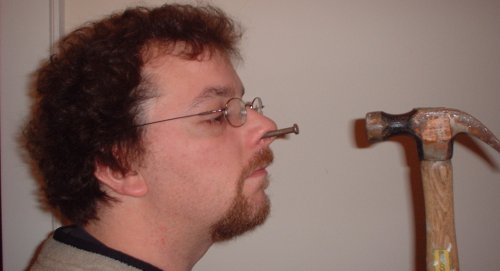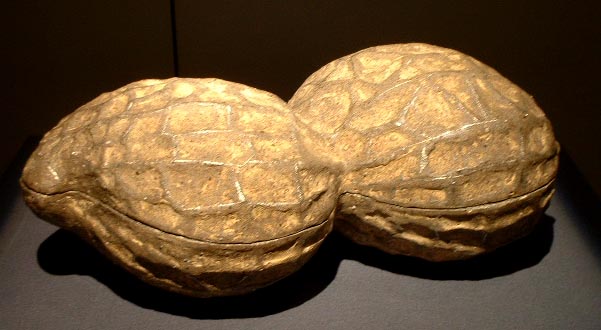 Io non ho mai ben afferrato l'abitudine tutta italiana di spegnere una intera nazione per l'estate, ma forse dopo tutto non è una idea così pessima. Soprattutto quando i risultati di chi "lavora" sono questi.
Io non ho mai ben afferrato l'abitudine tutta italiana di spegnere una intera nazione per l'estate, ma forse dopo tutto non è una idea così pessima. Soprattutto quando i risultati di chi "lavora" sono questi.
Nelle ultime settimane grazie a Ben Goldacre di Bad Science ho scoperto i lavori di Federica Mafrica e Vincenzo Fodale dell'Università di Messina e di V. Elia, E. Napoli e R. Germano dell'Università Federico II di Napoli.
I primi hanno scritto l'illuminante articolo: Down subjects and Oriental population share several specific attitudes and characteristics. L'articolo è pubblicato su una rivista medica dall'invitante titolo: Medical Hypotheses. L'articolo in questione è un prezioso esempio di scienza in cui si evidenzia come le persone affette da sindrome di Down abbiano alcune caratteristiche in comune con le popolazioni orientali, ad esempio:
Down subjects adore having several dishes displayed on the table, and have a propensity for food which is rich in monosodium glutamate.
mmm dovrò iniziare a contare i miei cromosomi perchè avere una tavola imbandita davanti mi fa un certo effetto. Soprattutto quando sono affamato.
The tendencies of Down subjects to carry out recreative-rehabilitative activities, such as embroidery, wicker-working, ceramics, book-binding, etc., that is renowned, remind [us of] the Chinese hand-crafts, which need a notable ability, such as Chinese vases, or the use of chopsticks employed for eating by Asiatic populations.
E' fanstastico che questa osservazione venga da due Italiani; del resto gli Italiani non sono mai stati interessati all'artigianato; è qualcosa di completamente estraneo alla nostra cultura, vero?
Down persons during waiting periods, when they get tired of standing up straight, crouch, squatting down, reminding us of the ’squatting’ position … They remain in this position for several minutes and only to rest themselves. This position is the same taken by the Vietnamese, the Thai, the Cambodian, the Chinese, while they are waiting at a bus stop, for instance, or while they are chatting.
Io ho sempre invidiato questa abilità; trovo la posizione di "squatting" estremamente scomoda. A pensarci bene (assunto che sia effettivamente qualcosa di genetico e non semplicemente dovuto ad abitudine) è un vantaggio evolutivo! io per riposarmi ho bisogno di una sedia!
There is another pose taken by Down subjects while they are sitting on a chair: they sit with their legs crossed while they are eating, writing, watching TV, as the Oriental peoples do.
Se avessero visto come mi sedevo prima di acquistare una sedia stokke mi avrebbero ricoverato oppure deportato come immigrato illegale.
Ma non è finita, l'estate è lunga e così V. Elia, E. Napoli e R. Germano invece di andare a Ischia a divertirsi hanno scritto l'articolo:
The ‘Memory of Water’: an almost deciphered enigma. Dissipative structures in extremely dilute aqueous solutions, pubbliato sulla rinomata rivista scientifica
Homeopathy. Si lo so anche a me fa un certo effetto scrivere scienza e omeopatia nella stessa frase senza il predicato nominale NON E'. Qui l'argomento è un po' più tecnico. In sintesi, i ritrovati omeopatici si basano sulla diluizione di un principio attivo; il problema è che il principio attivo viene diluito così tanto che alla fine c'è una buona probabilità che nel ritrovato non ci sia neanche una molecola del principio attivo. E' la cosa è un bene, perchè spesso i principi attivi sono tossici (come l'arsenico). Questo dovrebbe bastare per togliere qualunque dubbio sulla inutilità della pratica omeaopatica. Il fatto è che per dare una apparenza di validità al tutto gli omeopati fanno riferimento a un lavoro pubblicato nel 1988 da
Benveniste su Nature in cui si sosteneva fondamentalmente che l'acqua avesse memoria. Ovvero che l'acqua fosse in grado di ricordare le caratteristiche di un soluto anche dopo che il soluto fosse stato rimosso - proprio la teoria di cui l'omeopatia ha bisogno. In esperimenti successivi non si è riuscito a replicare i risultati di Benveniste. Questa estate la "prestigiosa" rivista
Homeopathy ha deciso di pubblicare un numero speciale dedicato alla memoria dell'acqua. Tra gli autori ci sono appunto Elia, Napoli e Germano. L'articolo completo è messo a disposizione da
Bad Science.
Non sono un chimico, quindi non posso criticare il metodo, quello che posso fare è però commentare come è stato scritto l'articolo.
Nella sezione "methods" non mi sembra che facciano riferimento a quali procedure sperimentali sono state adottate. Non fanno riferimento a come sono stati preparati i campioni ne a come il pH è stato misurato. Niente.
La base del metodo scientifico è la ripetibilità degli esperimenti. Se non si descrive esattamente come l'esperimento è stato compiuto esso non è ripetibile e quindi non è scientifico.
La cosa che più mi lascia perplesso è che entrambi i giornali di cui sopra sono pubblicati da Elsevier. Quello che reputavo un editore serio. Forse a questo punto dovrei ricalibrare le mie ambizioni e smettere di ambire a una pubblicazione su Automatica (che fa capo allo stesso editore).
Approfitto per chiedere scusa a tutti i ricercatori italiani che hanno passato l'estate a lavorare e che meriterebbero più pubblicità di quelli citati in questo post.
---
I have never quite got the Italian habit of shutting down an entire country for the summer; but after all it is not such a bad idea. Especially when the results of those who keep on working are these.
In the last few weeks thanks to Ben Goldacre at
Bad Science, I found out the works of Federica Mafrica and Vincenzo Fodale from the University of Messina and of V. Elia, E. Napoli e R. Germano from the University Federico II at Naples.
The former have written the bright paper
Down subjects and Oriental population share several specific attitudes and characteristics. The paper is published on a medical journal with the compelling title
Medical Hypotheses. The goal of the paper is to underline the fact that Down subjects and oriental people share some common features, such as:
Down subjects adore having several dishes displayed on the table, and have a propensity for food which is rich in monosodium glutamate.
mmmm I think I should start counting my chromosomes then... I love having several dished displayed on the table. Especially when I am hungry.
The tendencies of Down subjects to carry out recreative-rehabilitative activities, such as embroidery, wicker-working, ceramics, book-binding, etc., that is renowned, remind [us of] the Chinese hand-crafts, which need a notable ability, such as Chinese vases, or the use of chopsticks employed for eating by Asiatic populations.
It is great that this observation come from two Italians, after all Italians have never been really good at handcraft, right?
Down persons during waiting periods, when they get tired of standing up straight, crouch, squatting down, reminding us of the ’squatting’ position … They remain in this position for several minutes and only to rest themselves. This position is the same taken by the Vietnamese, the Thai, the Cambodian, the Chinese, while they are waiting at a bus stop, for instance, or while they are chatting.
I have always wanted to be able to squat in a comfortable way. In order to rest I need a chair. I think that being able to squat (if really it is a genetic feature and not cultural) is actually an evolutionary advantage.
There is another pose taken by Down subjects while they are sitting on a chair: they sit with their legs crossed while they are eating, writing, watching TV, as the Oriental peoples do.
If they had seen me sitting before I got a Stokke chair they would have hospitalized me or deported as an illegal alien.
The summer is long and so V. Elia, E. Napoli e R. Germano, instead of heading to Ischia and have fun at the beach, wrote:
The ‘Memory of Water’: an almost deciphered enigma. Dissipative structures in extremely dilute aqueous solutions, published on the scientific journal
Homeopathy. Yes I know... it does feel strange to use the word science and homeopathy in the same phrase without the words IS NOT. Here the subject is more technical so I'll try to summarize it. Homeopathy is based on the use of a diluted active principle. The thing is that it is so diluted that you have a good change of not having a single molecule of the principle in the drug. And that's good since homeopathic active principles are often toxic. This fact should be enough to debunk the whole homeopathy thing. Instead, Homeopathy practitioners reference to a work published in 1988 by
Benveniste on Nature in which he claimed that water has memory. Meaning that water somehow can remember the features of a susbtance that has been removed from it - right what homeopaths need. Too bad that the following experiments failed to replicate the phenomenon described in the paper. This summer the "prestigious"
Homeopathy Journal devoted an entire issue on the memory of water. Among the authors we find Elia, Napoli e Germano. The whole paper can be read at
Bad Science.
I am not a chemist and therefore I cannot critique the method; what I can do is comment on the fact that there is no method.
In their methods section, the authors do not refer to their experimental procedures; they do not say anything about how the samples were prepared or how the pH was measured. Nothing.
The basis of the scientific method is repeatability of experiments. If experiments are not described in details there is no science, because there is no repeatability.
What really strikes me is that both journal are published by Elsevier, what I thought to be a respectable editor. Maybe I should start reconsidering my aim at publishing on Automatica.
I would like to apologize to all the other Italian researchers who spent their summer working and who surely deserve more publicity that those people.
 Leggo con una sensazione mista di piacere e disgusto che dopotutto la cultura scientifico-matematica in Italia non è messa poi così male. Nel Regno Unito recentemente è stata messa in commercio una nuova lotteria istantanea. Si chiama Cool Cash. Si grattano delle caselle al di sotto delle quali ci sono delle temperature, se tutte le temperature sono più fredde di quella stampata in cima al biglietto si vince. Ora, il problema è che le temperature sono anche negative, ebbene la lotteria istantanea è stata ritirata dal commercio perchè la gente non capiva che -7 è più freddo di -3. Come, 7 è più grande d 3!
Leggo con una sensazione mista di piacere e disgusto che dopotutto la cultura scientifico-matematica in Italia non è messa poi così male. Nel Regno Unito recentemente è stata messa in commercio una nuova lotteria istantanea. Si chiama Cool Cash. Si grattano delle caselle al di sotto delle quali ci sono delle temperature, se tutte le temperature sono più fredde di quella stampata in cima al biglietto si vince. Ora, il problema è che le temperature sono anche negative, ebbene la lotteria istantanea è stata ritirata dal commercio perchè la gente non capiva che -7 è più freddo di -3. Come, 7 è più grande d 3!








